M11U1 导学案
- 格式:doc
- 大小:38.00 KB
- 文档页数:3
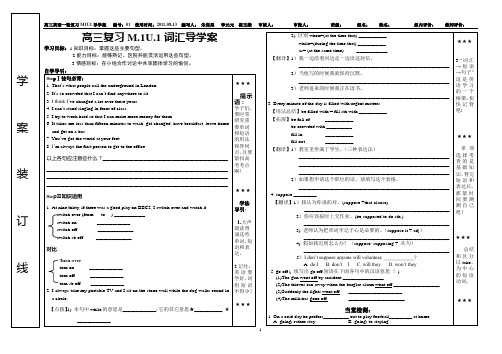
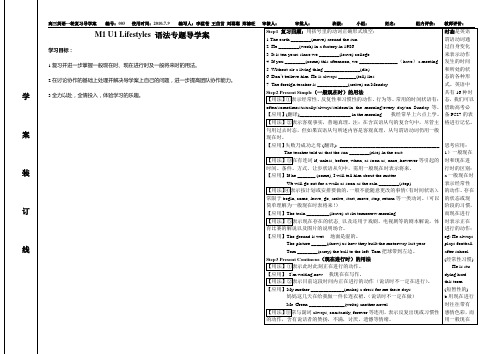
高三英语一轮复习导学案编号:003 使用时间:2010-7-9 编写人:李猛苍王苗苗刘聪聪郑德旺审核人:审批人:班级:小组:姓名:组内评价:教师评价:M1 U1 Lifestyles 语法专题导学案学习目标:1.复习并进一步掌握一般现在时、现在进行时及一般将来时的用法。
2.在讨论协作的基础上处理并解决导学案上自己的问题,进一步提高团队协作能力。
3.全力以赴,全情投入,体验学习的乐趣。
Step1 复习回顾:用括号里的动词正确形式填空:1.The earth ________(move) around the sun.2. He ________(work) in a factory in 1986.3. It is ten years since we ________(leave) college.4. If you ________(come) this afternoon, we _______________ (have)a meeting.5. Without air a living thing ______________(die).6. Don’t believe him. He is always _______(tell) lies.7. The foreign teacher is ____________(arrive) on Monday.Step2 Present Simple(一般现在时)的用法【用法】①表示经常性、反复性和习惯性的动作、行为等。
常用的时间状语有:often/sometimes/usually/always/seldom/in the morning/every day/on Sunday等。
【应用】(翻译)____________________ in the morning. 我经常早上六点上学。
【用法】②表示客观事实,普遍真理。
注:在含宾语从句的复合句中,尽管主句用过去时态,但如果宾语从句所述内容是客观真理,从句谓语动词仍用一般现在时。
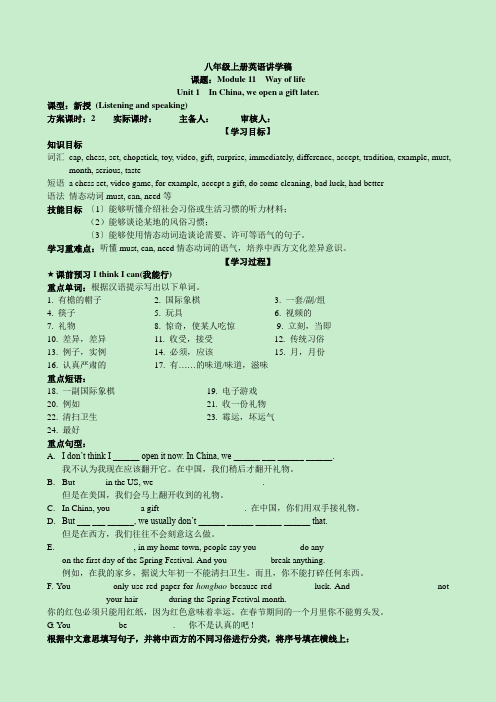
八年级上册英语讲学稿课题:Module 11 Way of lifeUnit 1 In China, we open a gift later.课型:新授(Listening and speaking)方案课时:2 实际课时:主备人:审核人:【学习目标】知识目标词汇cap, chess, set, chopstick, toy, video, gift, surprise, immediately, difference, accept, tradition, example, must, month, serious, taste短语 a chess set, video game, for example, accept a gift, do some cleaning, bad luck, had better语法情态动词must, can, need等技能目标〔1〕能够听懂介绍社会习俗或生活习惯的听力材料;(2)能够谈论某地的风俗习惯;〔3〕能够使用情态动词造谈论需要、许可等语气的句子。
学习重难点:听懂must, can, need情态动词的语气,培养中西方文化差异意识。
【学习过程】★课前预习I think I can(我能行)重点单词:根据汉语提示写出以下单词。
1. 有檐的帽子________2. 国际象棋________3. 一套/副/组________4. 筷子________5. 玩具________6. 视频的________7. 礼物________ 8. 惊奇,使某人吃惊________ 9. 立刻,当即________10. 差异,差异________ 11. 收受,接受________ 12. 传统习俗________13. 例子,实例________ 14. 必须,应该________ 15. 月,月份________16. 认真严肃的________ 17. 有……的味道/味道,滋味________重点短语:18. 一副国际象棋________________ 19. 电子游戏_____________________20. 例如___________________ 21. 收一份礼物____________________22. 清扫卫生___________________ 23. 霉运,坏运气___________________24. 最好__________________重点句型:A.I don’t think I ______ open it now. In China, we ______ ___ ______ ______.我不认为我现在应该翻开它。
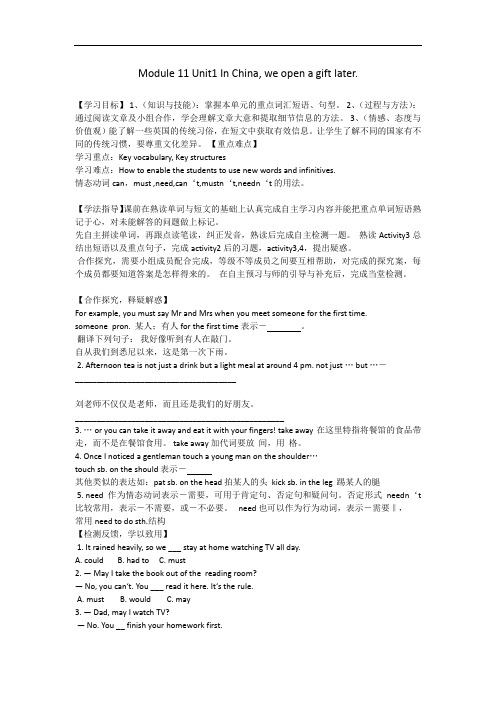
Module 11 Unit1 In China, we open a gift later.【学习目标】 1、(知识与技能):掌握本单元的重点词汇短语、句型。
2、(过程与方法):通过阅读文章及小组合作,学会理解文章大意和提取细节信息的方法。
3、(情感、态度与价值观)能了解一些英国的传统习俗,在短文中获取有效信息。
让学生了解不同的国家有不同的传统习惯,要尊重文化差异。
【重点难点】学习重点:Key vocabulary, Key structures学习难点:How to enable the students to use new words and infinitives.情态动词can,must ,need,can‘t,mustn‘t,needn‘t 的用法。
【学法指导】课前在熟读单词与短文的基础上认真完成自主学习内容并能把重点单词短语熟记于心,对未能解答的问题做上标记。
先自主拼读单词,再跟点读笔读,纠正发音,熟读后完成自主检测一题。
熟读Activity3总结出短语以及重点句子,完成activity2后的习题,activity3,4,提出疑惑。
合作探究,需要小组成员配合完成,等级不等成员之间要互相帮助,对完成的探究案,每个成员都要知道答案是怎样得来的。
在自主预习与师的引导与补充后,完成当堂检测。
【合作探究,释疑解惑】For example, you must say Mr and Mrs when you meet someone for the first time.someone pron. 某人;有人 for the first time表示―。
翻译下列句子:我好像听到有人在敲门。
自从我们到悉尼以来,这是第一次下雨。
2. Afternoon tea is not just a drink but a light meal at around 4 pm. not just … but …―_____________________________________刘老师不仅仅是老师,而且还是我们的好朋友。
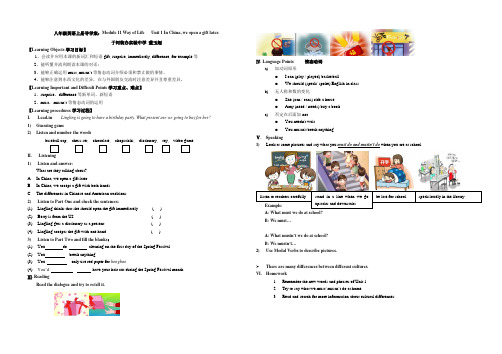
八年级英语上册导学案:Module 11 Way of Life Unit 1 In China, we open a gift later.于河街办实验中学董玉超【Learning Objects学习目标】1、会读并应用本课的新词汇和短语gift, surprise, immediately, difference, for example等2、能听懂并流利朗读本课的对话;3、能够正确运用must, mustn’t等情态动词介绍必须和禁止做的事情。
4、能够注意到东西文化的差异,在与外国朋友交流时注意差异并且尊重差异。
【Learning Important and Difficult Points学习重点、难点】1、surprise,difference等新单词、新短语2、must,mustn’t等情态动词的运用【Learning procedures学习过程】I.Lead-in Lingling is going to have a birthday party. What present are we going to buy for her?1)Guessing game2)Listen and number the wordsbaseball cap, chess set, chocolate, chopsticks, dictionary, toy, video gameII. Listening1)Listen and answer:What are they talking about?A.In China, we open a gift later.B.In China, we accept a gift with both hands.C.The differences in Chinese and American traditions.2)Listen to Part One and check the sentences:(1)Lingling thinks that she should open the gift immediately. ( )(2)Betty is from the US. ( )(3)Lingling gets a dictionary as a present. ( )(4)Lingling accepts the gift with one hand. ( )3)Listen to Part Two and fill the blanks:(1)You do cleaning on the first day of the Spring Festival.(2)You break anything.(3)You only use red paper for hongbao.(4)You’d have your hair cut during the Spring Festival month.Ⅲ. ReadingRead the dialogue and try to retell it.Ⅳ. Language Points 情态动词:a)加动词原形●I can (play / played) basketball.●We should (speak/ spoke) English in class.b)无人称和数的变化●She (can / cans) ride a horse.●Amy (need / needs) buy a book.c)否定在后面加not●You needn't wait.●You mustn't break anything.Ⅴ. Speaking1)Look at some pictures and say what you must do and mustn't dowhen you are at school.A: What must we do at school?B: We must…A: What mustn’t we do at school?B: We mustn’t…2)Use Modal Verbs to describe pictures.There are many differences between different cultures.VI.Homework1.Remember the new words and phrases of Unit 1.2.Try to say what we must/ mustn’t do at home.3.Read and search for more information about cultural differences.。
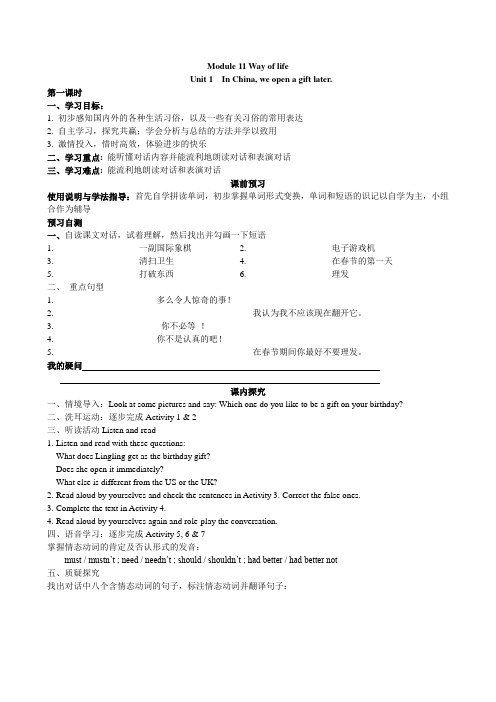
Module 11 Way of lifeUnit 1 In China, we open a gift later.第一课时一、学习目标:1. 初步感知国内外的各种生活习俗,以及一些有关习俗的常用表达2. 自主学习,探究共赢;学会分析与总结的方法并学以致用3. 激情投入,惜时高效,体验进步的快乐二、学习重点: 能听懂对话内容并能流利地朗读对话和表演对话三、学习难点: 能流利地朗读对话和表演对话课前预习使用说明与学法指导:首先自学拼读单词,初步掌握单词形式变换,单词和短语的识记以自学为主,小组合作为辅导预习自测一、自读课文对话,试着理解,然后找出并勾画一下短语1. _________________ 一副国际象棋2. _________________ 电子游戏机3. _________________ 清扫卫生4. _________________ 在春节的第一天5. _________________ 打破东西6. _________________ 理发二、重点句型1. _______________________多么令人惊奇的事!2. ___________________________________________ 我认为我不应该现在翻开它。
3. ________________________你不必等!4. _______________________你不是认真的吧!5. ___________________________________________ 在春节期间你最好不要理发。
我的疑问课内探究一、情境导入:Look at some pictures and say: Which one do you like to be a gift on your birthday?二、洗耳运动:逐步完成Activity 1 & 2三、听读活动Listen and read1. Listen and read with these questions:What does Lingling get as the birthday gift?Does she open it immediately?What else is different from the US or the UK?2. Read aloud by yourselves and check the sentences in Activity3. Correct the false ones.3. Complete the text in Activity4.4. Read aloud by yourselves again and role-play the conversation.四、语音学习:逐步完成Activity 5, 6 & 7掌握情态动词的肯定及否认形式的发音:must / mustn’t ; need / needn’t ; should / shouldn’t ; had better / had better not五、质疑探究找出对话中八个含情态动词的句子,标注情态动词并翻译句子:___________________________________________________________________________________________ ___________________________________________________________________________________________ ___________________________________________________________________________________________ ______________________________________________________________________________________________________________________________________________________________________________________ ___________________________________________________________________________________________ ______________________________________________________________________________________六、当堂检测1. 大年初一我们不准扫地。
正德中学高三英语导学案 M1 U1 reading一、重点单词二、重点短语1、_________vt.出席,参加 1、______________________________注意2、_________vt.获得;赚,挣得 2、______________________(书的)封底3、_________n.&vt.尊敬,敬重 3、________________________一代又一代4、_________vt.赢得,取得;实现,成就 4、________________________平均5、_________n.学分;成绩;等级 5、_______________________过去常常做6、_________n.文学 6、_______________________逐字地7、_________adj.一般的,普通的;平均的 7、________________________首先8、_________adj.具有挑战性的 8、_____________________介绍……给……9、_________adj.额外的,外加的 10、_________vt.&vi.准备 11、_________vt.放弃12、_________vt.思念,想念 13、_________vt.经历,体验 14、_________vt.介绍三、Language points:1. Going to a British high school for one year was a very enjoyable and exciting experience for me.●本句是主谓表结构(SVC),句中going to a British high school for one year是动名词短语,作主语。
动名词短语的作用相当于一个名词,在句中常作主语、宾语或表语。
例如:Reading French is easier than speaking it.●句中exciting是现在分词,相当于形容词,作定语,修饰experience.注意:英语中有一类及物动词,在词尾加-ing或-ed后,相当一个形容词,但意义不同。
《M1,U1词汇》导学案【学习目标】掌握各词条的词性、基本含义,了解相关词形变化或近义词,识记一些典型例句,对重要用法能理解运用。
【学习重点】各词条的基木含义及其运用。
【学习难点】预测:近义词辨析及活学活用。
【预习要求】①词汇学习以识记、理解为主,忌只做笔头作业。
②完成导学案后圈出难点,小组讨论。
③对照FI标找出差距。
【学习内容】下列16个词条(未涉及词汇你认为重要的请整理补充)。
本案共计1课时。
【学习过程】:1.attend vt. th席,参加,上(学),到场【原句回放】On the first day, all students went to attend assembly.【常用搭配】attend school/class/ church I:学/课/公教堂attend a meeting / lecture / wedding / party 参加仪式/会议同义词:take part in, join join in, participate.【知识拓展】attend to注意倾听,专心T ,照料,处理attend (on/upon) sb.伺候/照顾某人【即学即用】(C级)Attend carefully _____ what she is saying•注意听她说话。
The patient has three nurses __________ her.那个病人有三个护_L看护她。
2.experience [Cj经历,阅历[U]经验v..经验,体验,经历,阅历【原句回放】(Page 2) Going to a British high school for one year was a very enjoyable and exciting experience for me.【语言实践】(C级)1 )He hasn't got enough experience for the job. 译: ___________________________________ 2) Yesterday aftemoon Frank Hawkins was telling me about his experiences as a young man.译: ___________________________________________________________________________3) Some of the students had experienced what hardships meant before they entered theuniversity.译: ___________________________________________________________________________【即学即用】(C级)1) ___________________ Jumping out of _________________________ a irplane at ten thousand feet is quite _____ exciting experience.(NMET 2002, 26)A. /; theB. /; anC. an; an D・ the; the2)Some of the passengers told the reporters about their ____ in the burning train.A. details B・ trips C・ events D. experiences3.earn V.挣得,博得earnings: n.所得,收入【常用搭配】earn one's living 自行谋生(=make a living)【语言实践】(C级)The workers earned less money because they had to pay medical insurance・译:__________________________________________________________________The old man earned his living by selling vegetables・译:__________________________________________________________________As we know, it9s his honesty that earned the admiration of his friends.译:__________________________________________________________________It9s said that a person's intelligence and abilities have a direct effect on his or her earnings.译:__________________________________________________________________【知识拓展】区另ij : earn , gain , win【小试牛刀】1)He has _______ a lot of money by working part-time job・他通过做兼职,已经挣了好多钱。
Module 11 Body languageUnit 1 They touch noses!【学习目标】1.知识目标:能拼读unit 1新单词和词组,。
2.能力目标:能记忆unit 1所出现的新单词和词组,并能进行听写。
3.情感目标:通过小组共同学习,激发学习兴趣,发扬互相帮助的精神。
预习自学案一根据中文意思在unit 1中找出英文的词组。
(自学-对学-群学-展示)1.鞠躬 __ 2. 亲吻. 3. 在握手__ 4.微笑 5. 英国人的 _ 6. 德国人 7. 日本人 __ 8. 俄罗斯人9. 游客 __ 10. 什么 11.点头__ 12头部13拥抱 __ 14互相二.根据中文意思在unit 1中找出英文的句子。
(自学-对学-群学-展示)1.当我们遇见游客时,我们中国人经常握手和微笑._____________________________________________________2.这是因为不同国家的人会做不同的事情.____________________________________________________________3.美国的人和别人见面通常做什么?__________________________________________________________合作探究案一、情境导入1教师创设情景,引出课文内容。
2完成Activity 2,加深对课文的了解。
二、听力(自主完成,合作释疑)1.听activity 1(独学+展示),完成activity 1练习2.听activity 3两次,完成activity 2的配对练习后回答Activity4的问题,小组内核对答案。
三、大声朗读和理解对话意思。
1.以小组为单位大声朗读对话,先读完的小组先坐下。
2.分组竞赛朗读,其他组找读音有误之处。
3.小组内合作解决activity 3的汉语意思,找出不懂的地方。
训练巩固案Ⅰ. 根据句意及所给汉语提示写出句中所缺单词。
教学资料范本【2020最新】外研版七年级英语下册导学案:M11+U1编辑:__________________时间:__________________课型:Listening and Vocabulary主备人完成时间议课时间共案发放时间上课时间审核人林素芳第15周第15周第16周第16、17周徐海英班级:姓名:小组:学习目标1.. Key vocabulary: bow, kiss, shake hands, smile, British,German, Japanese, Russian, visitor, Russia,nod, head, hug, each other, India, together,Maori, touch, nose2.. Key structures: 祈使句。
3.. 重、难点:祈使句的使用。
备注(教师复备栏及学生笔记)自主学习学法指导:1.. 注意发音,正确朗读生词。
2..牢记单词的拼写及词意。
3.. 通过听读对话,学会自主交流预习。
1..独学:将书翻到生词表,拼读P109—110单词,从bow到nose..提示:请用红色笔勾画出你不会拼读的单词。
2..对学:请你找你的搭档一起解决刚才画出的那些不会的单词。
1、画出Unit 1的思维导图。
2、《优化训练》P78,自主预习3、英语报,第33期,第三版,Unit 1,第一大题根据句意及汉语提示,写出正确的单词。
1) It’s very cold.. Tony’s ______ (鼻子2) --- Where is your new friend from?--- ______ (印度), an Asian country..3) Don’t ______ (触摸) the dog, Tom! It’s dangerous!4) There is always a big ______ (微笑) on my teacher’s face..5) Mrs.. Black ______ (亲吻) her son and then left home..组长签名:合作探究一、思考1.. 问候的方式有哪些?2.. 你知道吗?不同国家之间问候的体态语(bodylanguage)是不一样的。
Module 11 Unit1 Careers and skills
Read the passage on Pages 2-3 and fill in the form(Write no more than three words for each one)
Answer the questions below:
1.What are the three types of jobs the author talks about?(within 8 words)
2.Why do the people with unusual jobs like their jobs so much?(within 6 words)
3.Give two examples of so-called glamorous jobs.(within 3 words)
4.What does the author discuss in the article?(within 10 words)
Module 11 Unit 1 Checking corner Name ______________ Words:
1.reflection n.考虑,深思v.映出,反射,表现_________ adj.思考的,反射的_______
2.option n.选择,可供选择的事物adj可选择的__________________
3.baggage n.行李同义词________ 绷带___________ 卷心菜________
包裹________ 垃圾________ 车库_________
4.grocer n. 食品杂货商n. 食品杂货,食品杂货店_______________
wyer n.律师n. 法律, 规则,定律____________
6.fox n.狐狸adj.狡猾的,奸诈的,妖艳的___________
7.glamorous adj.富有魅力的,令人向往的同义词_______ 、______
8.nerve n.神经,勇气adj. 紧张的,神经质的__________________
9.investigative adj.探究性的,调查研究的v. 调查,研究_______________
10.realistic adj. 现实的,可实现的,逼真的v. 实现__________ n. 现实______
11.enterprising adj. 有事业心的,有进取心的n.企业,事业,进取心_________ Phrases
1.从…选择choose_______
2.毕业之后after __________
3.对…合适,适宜be_________ to
4.事实上in ___________
5.只有极少数only a very small ____________of
6.考虑到方方面面consider _________ the aspects of
7.在巨大压力下___________ huge/great pressure/stress
8.节食,减肥be/go ____ a diet
9.立志做某事_______ ambitions to do sth
10.伴随…而来come ______
11.同样地_______ the same way
12.噪音污染noise ________
13.过日子______ through/about our daily lives
14.与...一致/符合correspond_________
15.以...为乐________ pleasure in
Writing:某英语杂志社正在举行征稿活动,主题为“梦想点亮人生”,请你用英语写一篇小短文,向该杂志社投稿。
要点如下:
1.你的梦想是什么?
2.阐述拥有梦想如何点亮人生,使你的生活变得不同;
3.你认为实现梦想需要什么?
Sample:
Dreams can make us powerful and different. It is good to make effort to make our dream come true.
I have been dreaming of becoming a doctor since childhood. Each time I see someone suffering from a disease, I feel sympathy for them. Also, I really admire doctors, for they can help patients by using their professional knowledge . I know if Iwant to be a doctor , I need to master essential medical knowledge and accumulate a great deal of experience . Keeping this dream in mind, I need to take action to realize it. As a middle school student, I know I should work hard right now to master some basic knowledge and try my best to enter a good medical university. This is how my dream can lighten my life. Now I have a goal to fight for! My life has become completely different.
Admittedly, it is not easy to live our dreams. I think the most important thing is that we stick to it and never give it up . On top of this, we should also use the right approach.。